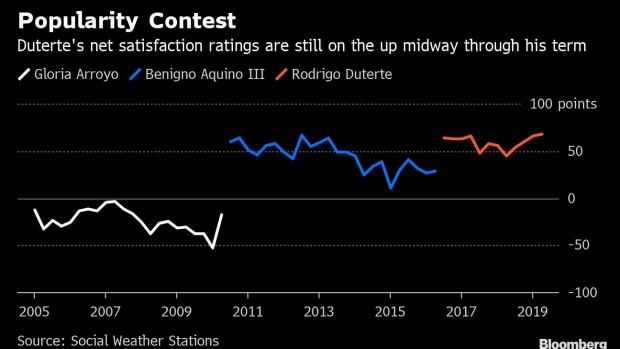Jul 20, 2019
An Empowered Duterte Sets His Sights on Drug War, Death Penalty
, Bloomberg News

(Bloomberg) -- President Rodrigo Duterte will likely avoid a lame-duck phase in the second half of his term, leveraging high approval ratings and a super-majority in Congress to seal his policy agenda.
Bills to overhaul the Philippine constitution, strengthen the drug war, and make the economy more competitive are expected to be the President’s priorities when he speaks to lawmakers at the annual State of the Nation Address on Monday.
“The President will be more gung-ho after securing a new mandate in the midterms," University of the Philippines assistant professor Jean Encinas-Franco said. "He will want to tick off all the items in his platform before 2022.”
Death penalty
Duterte wants to revive the death penalty, which the Philippines suspended in 2006, for drug trafficking and other heinous crimes, saying it will instill fear among would-be perpetrators. He also endorsed lowering the minimum age of criminal responsibility from 15 to as young as nine years old to target syndicates using children to distribute drugs.
The administration could find it easier to pass the bills now with more supporters in the Senate, which previously blocked the measures. However, Franco said legislators will have to weigh the president’s wishes against a lack of support from the church, civil society groups and the wider public.
Tax reform
After the first bout of tax reform was blamed for the inflation spike in 2018, lawmakers have been wary to approve measures in Congress. One of the most contentious has been the plan to streamline incentives, opposed by manufacturers and call center firms which stand to lose tax holidays. There are also bills to hike alcohol taxes, simplify capital income levies, and implement a tax amnesty program.
According to Foundation for Economic Freedom president Calixto Chikiamco, the entire array of tax reforms could still be passed before 2022 since the economic team enjoys strong backing from Duterte.
Foreign ownership
The economic team has routinely cited foreign equity restrictions as one of the reasons the Philippines lags behind its neighbors in attracting investments. While many of the broad ownership caps are enshrined in the constitution, amendments to certain laws could liberalize sectors like retail, telecommunications and certain professions.
Chikiamco said there is greater openness among lawmakers to relax foreign ownership rules because of growing clamor from consumers for better quality goods and services.
Federalism
Duterte has been pushing for a shift to a U.S.-style federal form of government to spread economic growth outside the capital, but his efforts have been hampered by opposition from senators and even his own economic managers.
With three years remaining in his term, the president urged lawmakers this month to change the Constitution “now.” Franco said Duterte allies will have to hammer out problems over over costs and how the federal shift will be implemented to win broader support in Congress.
To contact the reporters on this story: Claire Jiao in Manila at cjiao5@bloomberg.net;Andreo Calonzo in Manila at acalonzo1@bloomberg.net
To contact the editors responsible for this story: Cecilia Yap at cyap19@bloomberg.net, Ruth Pollard
©2019 Bloomberg L.P.





